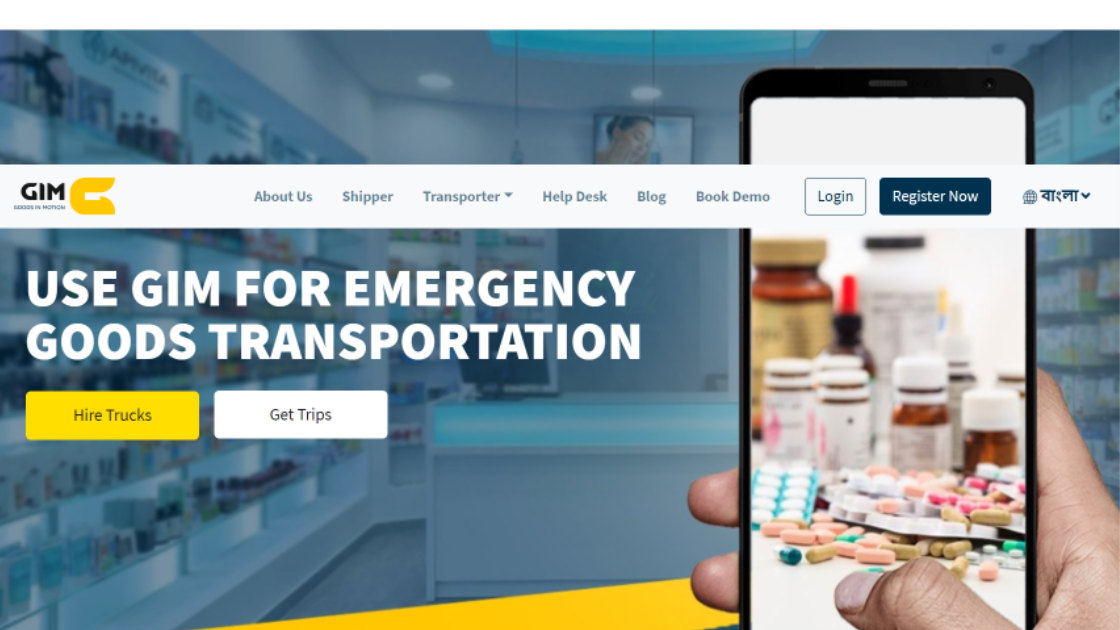
Founded by Alamgir Alvi in 2018, Goods in Motion (GIM) is one of the few online truck rental marketplace apps or digital platforms looking to transform how the trucking industry works in Bangladesh. The company, a part of eJogajog Limited, aims to minimize the commercial transportation challenges in Bangladesh and thereby boost economic growth.
Digital trucking has been receiving growing attention across markets in the past few years — for example, we have seen companies like Full Truck Alliance in China draw huge valuations. Bangladesh is no different. We have tracked more than 6 startups offering digital trucking services in Dhaka. Some of these companies are doing extremely well. For example, Truck Lagbe, one of the earliest players in the vertical, just raised an investment from IFC and now calls itself uber for trucking. GIM is one of the leading players in the vertical in Dhaka.
By registering on GIM, truck owners, agencies, and drivers can effortlessly connect with customers in need of various sorts of trucks. With the slogan “Technology in Logistics,” the GIM Digital Truck app has already received an excellent response from users by ensuring international grade service and safe transportation. The company claims to have over 14,000 vehicles on its platform and to have served over 3000 clients across 61+ districts.
For businesses to maintain an efficient supply chain, the presence of online third-party logistics companies (3PL) such as GIM is critical. The primary objective of logistics is to eliminate waste at any point in the supply chain, particularly time spent delivering goods and raw materials. When businesses, as well as individuals, utilize GIM's free app to hire trucks, the time lost in physically visiting truck stands to find the required truck is almost entirely removed.
With the rise of internet penetration and an increasing number of consumers getting accustomed to digital services, Bangladesh is witnessing the emergence of a new generation of digital logistics firms seeking to make trucking more accessible. These firms have developed apps that serve as a bridge between clients and shippers, allowing the former to book trucks with the click of a button. These organizations promise to find trucks at a competitive price for shipments, saving businesses time and money.
Trucking is a big market. The digital entrants are relatively new in the market and most of these companies only cover certain geographic locations where users are relatively tech-savvy. Trucking is not known for tech adoption, which means it is going to take time.
Truck Lagbe is one of the earliest players in the vertical and has built a significant business. Shohoz Truck, Loop Freight, Truck Kothay, and Sheba.xyz are some of the prominent players in the vertical. Paperfly Private Limited has recently signed a contract with Shohoz Truck to ensure top-class digital supply chain and logistics services and to streamline the flow of shipment. So to say, convergence can be expected in the coming years between truck companies and ecommerce logistics.
Industry insiders suggest the market is big enough to accommodate multiple players in the vertical. Moreover, since the market is at its early stage, digital trucking companies are rarely competing with each other for market share, rather the competition is with the traditional trucking industry to grow the overall market share of digital trucking.
That being said, digital offers an opportunity to aggregate meaning the largest player usually enjoys greater market power. To that end, digital trucking companies are likely to go for each other’s domain introducing similar services and features that we are already seeing in the market.
Bangladesh ranked well behind India and Sri Lanka in the Global Logistics Performance Index-2018 (Bangladesh 100th, India 44th, and Sri Lanka 94th among 160 countries). According to the World Bank, a 17% reduction in logistics costs will improve Bangladesh's RMG export by 7.4%, or over $4 billion. Since Bangladesh is at a vital crossroads in its inclusive trade and economic development momentum, the demand for a customer-focused logistics system has increased.
To that end, digital trucking services like GIM could play an important role in improving the overall efficiency of the logistics sector with the help of greater integration of the technology. With features like easy booking, transparency, online bidding, quick payment, confirmed return trips, and 24/7 customer service, the company has already built a competitive truck rental service. For drivers, anyone having a truck with valid documents and an appropriate driving license can avail of trips from GIM. Initiatives like this not only assist the logistics sector in remaining competitive on a worldwide scale but also assist the truck operator community in facilitating socio-economic growth.
